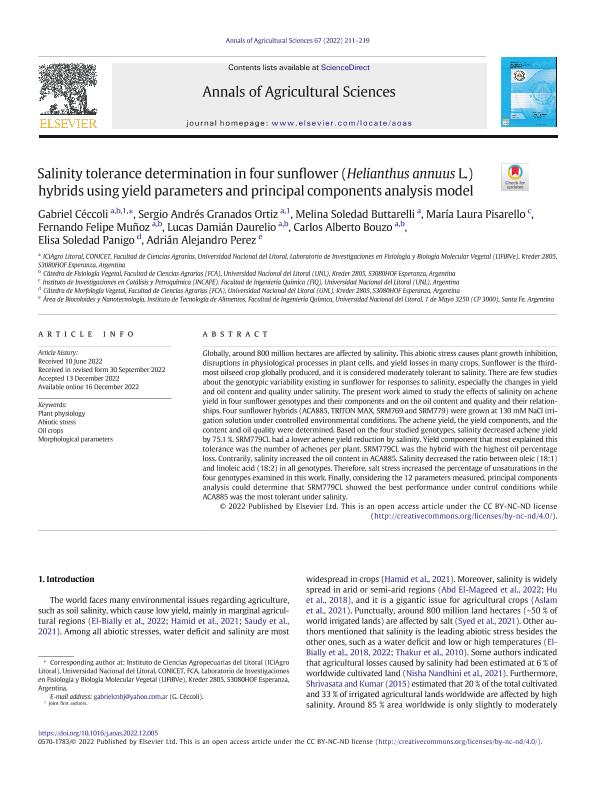Artículo
Salinity tolerance determination in four sunflower (Helianthus annuus L.) hybrids using yield parameters and principal components analysis model
Céccoli, Gabriel ; Granados Ortiz, Sergio Andrés
; Granados Ortiz, Sergio Andrés ; Buttarelli, Melina Soledad
; Buttarelli, Melina Soledad ; Pisarello, María Laura; Muñoz, Fernando Felipe
; Pisarello, María Laura; Muñoz, Fernando Felipe ; Daurelio, Lucas Damian
; Daurelio, Lucas Damian ; Bouzo, Carlos Alberto; Panigo, Elisa
; Bouzo, Carlos Alberto; Panigo, Elisa ; Perez, Adrián Alejandro
; Perez, Adrián Alejandro
 ; Granados Ortiz, Sergio Andrés
; Granados Ortiz, Sergio Andrés ; Buttarelli, Melina Soledad
; Buttarelli, Melina Soledad ; Pisarello, María Laura; Muñoz, Fernando Felipe
; Pisarello, María Laura; Muñoz, Fernando Felipe ; Daurelio, Lucas Damian
; Daurelio, Lucas Damian ; Bouzo, Carlos Alberto; Panigo, Elisa
; Bouzo, Carlos Alberto; Panigo, Elisa ; Perez, Adrián Alejandro
; Perez, Adrián Alejandro
Fecha de publicación:
12/2022
Editorial:
Elsevier
Revista:
Annals of Agricultural Sciences
ISSN:
0570-1783
Idioma:
Inglés
Tipo de recurso:
Artículo publicado
Clasificación temática:
Resumen
Globally, around 800 million hectares are affected by salinity. This abiotic stress causes plant growth inhibition, disruptions in physiological processes in plant cells, and yield losses in many crops. Sunflower is the third-most oilseed crop globally produced, and it is considered moderately tolerant to salinity. There are few studies about the genotypic variability existing in sunflower for responses to salinity, especially the changes in yield and oil content and quality under salinity. The present work aimed to study the effects of salinity on achene yield in four sunflower genotypes and their components and on the oil content and quality and their relationships. Four sunflower hybrids (ACA885, TRITON MAX, SRM769 and SRM779) were grown at 130 mM NaCl irrigation solution under controlled environmental conditions. The achene yield, the yield components, and the content and oil quality were determined. Based on the four studied genotypes, salinity decreased achene yield by 75.1 %. SRM779CL had a lower achene yield reduction by salinity. Yield component that most explained this tolerance was the number of achenes per plant. SRM779CL was the hybrid with the highest oil percentage loss. Contrarily, salinity increased the oil content in ACA885. Salinity decreased the ratio between oleic (18:1) and linoleic acid (18:2) in all genotypes. Therefore, salt stress increased the percentage of unsaturations in the four genotypes examined in this work. Finally, considering the 12 parameters measured, principal components analysis could determine that SRM779CL showed the best performance under control conditions while ACA885 was the most tolerant under salinity.
Palabras clave:
ABIOTIC STRESS
,
MORPHOLOGICAL PARAMETERS
,
OIL CROPS
,
PLANT PHYSIOLOGY
Archivos asociados
Licencia
Identificadores
Colecciones
Articulos (ICIAGRO-Litoral)
Articulos de INSTITUTO DE CIENCIAS AGROPECUARIAS DEL LITORAL
Articulos de INSTITUTO DE CIENCIAS AGROPECUARIAS DEL LITORAL
Articulos(CCT - SANTA FE)
Articulos de CTRO.CIENTIFICO TECNOL.CONICET - SANTA FE
Articulos de CTRO.CIENTIFICO TECNOL.CONICET - SANTA FE
Articulos(INCAPE)
Articulos de INST.DE INVEST.EN CATALISIS Y PETROQUIMICA "ING. JOSE MIGUEL PARERA"
Articulos de INST.DE INVEST.EN CATALISIS Y PETROQUIMICA "ING. JOSE MIGUEL PARERA"
Citación
Céccoli, Gabriel; Granados Ortiz, Sergio Andrés; Buttarelli, Melina Soledad; Pisarello, María Laura; Muñoz, Fernando Felipe; et al.; Salinity tolerance determination in four sunflower (Helianthus annuus L.) hybrids using yield parameters and principal components analysis model; Elsevier; Annals of Agricultural Sciences; 67; 2; 12-2022; 211-219
Compartir
Altmétricas



